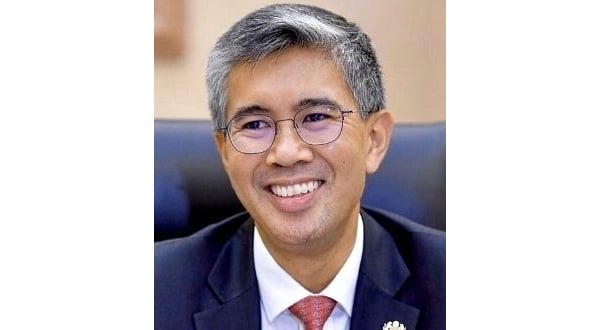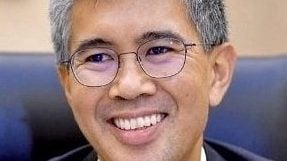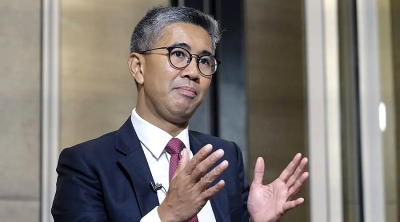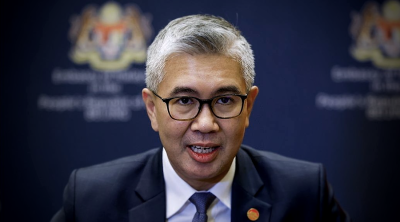
Humans have always struggled on striking a balance between short-term gains and long-term returns because the human brain is hard-wired to favor instant gratification.
Hence, it is never easy to convince people to act now for a future gain, even though the benefit is clear. If it was that easy, everyone would be selling insurance!
When I was the CEO of a regional bank, I always insisted on presenting the longer-term perspective to our shareholders, who tend to have a short-term view.
Such short-termism may, for example, hamper a multi-year restructuring plan from panning out properly.
Now that I am in the government, the responsibility of convincing stakeholders of the long view becomes more daunting.
This is particularly so when millions of lives and livelihoods have been at stake due to the pandemic, and current inflationary pressures caused by external factors exacerbate short-term concerns.
There is no textbook formula on how to walk this tightrope to achieve that delicate balance between current and future needs. Often, it is almost like a zero-sum game.
As a policy maker responsible for the nation’s finance, the MOF must make judgment calls based on multiple, and often competing factors.
Responsible policy making will ensure that any trade-offs were worth the gains, whether in the long or immediate term.
But when COVID-19 happened – claiming over six million lives, infecting over half a billion people and leaving a trail of economic ruin in its wake – governments the world over, including Malaysia, had no choice but to focus on short-term relief measures for its people, particularly the poor and vulnerable.
In Malaysia, furloughed workers and impacted businesses were given lifelines, through eight national stimulus and aid packages, collectively valued at RM530 billion.
Further, dipping deep into the national reserves to provide immediate, critical vaccination for 32 million Malaysians also meant that the government had to suspend or postpone some of its longer-term reform and fiscal plans.
But I have always impressed upon my Ministry of Finance (MOF) colleagues that we should not waste a good crisis and must continue with our fiscal reform agenda. This is, in fact, an opportune time for the Great Reset.
Since 2020, MOF has also focused on building socioeconomic resilience so that our people and businesses can bounce back stronger than before should another crisis of the COVID-19 magnitude, or worse, come our way.
What is key is fiscal resilience, without which we will not have the means to help our people recover and thrive.
To build the foundations for long term reforms through immediate-term decisions, the MOF is guided by three key principles: responsive; responsible and reformist.
As much as possible, policies are premised on environmental social and governance (ESG), as well as sustainable development goals (SDG) considerations.
Hence, MOF-curated responsive short-term measures must also fulfill the responsible criteria.
In the past two years, we have also mapped most of our budget measures against specific SDGs to ensure the nation’s future well-being.
A good example is our policy to expand the coverage of social protection programs, to more vulnerable groups like single mothers and the informal/gig sector.
Under this year’s Budget, the government also allocated RM80 million to extend social protection for housewives and widows against the risk of disability, illness, or old age through EPF and Social Security Organization (SOCSO).
All these are current policy decisions for the rakyat’s future well-being.
Another case in point is how we managed to register many of the B40 and M40 into the system when we first disbursed the direct cash aid in 2020-2021.
There were few complaints as the aid was credited directly into their bank accounts.
For subsequent direct aid measures, we have used the same central database, which is constantly updated and cross-checked against 27 government agencies’ data to minimize errors for future policy interventions.
Even measures such as the HRD Corp’s reskilling and upskilling measures are premised on the medium and longer-term view because it is crucial to maintain one’s skillset even during a job-search period, or the loss of capacity would be tougher to redress later.
While we are being responsive in the short-term, the MOF is also walking the talk on being fiscally responsible.
We plan to table the Fiscal Responsibility Act (FRA), which will also encompass our mid-term revenue strategy – and guiding principles on aspects such as a wider revenue base and statutory debt limits – to Parliament by end-2022.
Financially, a nation must be run like a tight ship, so that we have sufficient resources to implement the appropriate reform programs and fulfill the nation’s ESG agenda.
All these, and more, are also reflected in our recently published Pre-Budget Statement, which sets out our priorities for Budget 2023.
Reforms premised on ESG considerations to build long-term socioeconomic resilience are our best defense against future shocks and pandemics.
In fact, the national sustainability journey has already begun in earnest through the GLICs, with entities like Khazanah, EPF and PNB having launched their respective sustainability frameworks and targets.
Funding-wise, even our banking sector has its new five-year Financial Sector Blueprint to encourage financing that supports, among others, Malaysia’s sustainability goals.
But constant communication is key to drive home the message that metaphorically, to physically prepare for a marathon (long journey of development), the body must first be kept healthy (fiscally responsible).
Reforms are a tougher sell, because they could involve (again, metaphorically speaking) chopping off a cancerous limb (e.g., blanket subsidies) and undergoing chemotherapy (responsible spending) for us to survive.
In juggling short-term needs and long-term benefits, the MOF is always focused on finding the best policy solutions that will benefit the largest number of beneficiaries and consider multi-stakeholder interests.
Thus far, I believe MOF has proven that it is responsive enough to ensure not just quick wins, but also medium-term stability and longer-term responsible changes that will help us navigate an ever-changing operational landscape for lasting reforms.
Sure, there will always be trade-offs but I am optimistic that there are enough responsible adults in Keluarga Malaysia with the will and foresight to never be swayed by short-termism and populist views that could jeopardize our children and future generations’ ability to meet their own needs.
(Tengku Zafrul bin Tengku Abdul Aziz is the Minister of Finance, Malaysia.)
ADVERTISEMENT
ADVERTISEMENT






































